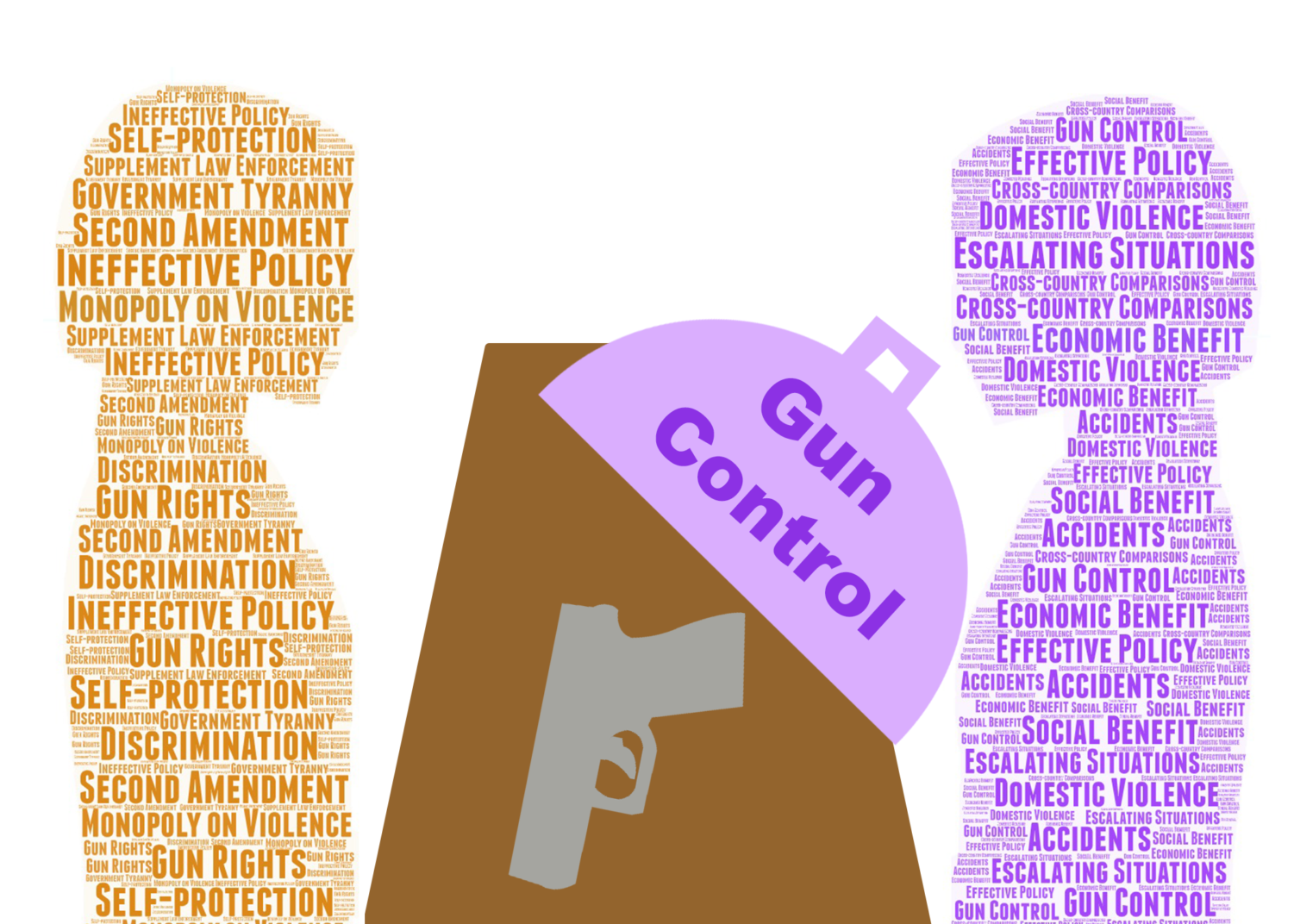
Examining the Due Process Concerns in American Gun Rights
The current political climate in the United States is full of problems when it comes to due process — a principle that many claim should be applied evenly to all issues. Lately, there has been a growing chorus of voices decrying what they see as the selective application of due process in controversial areas such as immigration and firearm rights. In a nation that cherishes its constitutional guarantees, it is super important to figure a path through the tangled issues surrounding the Second Amendment and how our rights as gun owners are protected, or in some cases, undermined.
This opinion editorial takes a closer look at these thorny issues, examines the arguments from both proponents and critics of current policies, and offers a fresh perspective on the challenges that remain unresolved. We will dig into the finer points of procedural fairness in contexts where noncitizens and American gun owners find themselves treated quite differently.
Due Process in the Context of Immigration Versus Gun Rights
One of the trickiest parts in today’s political debate centers around the idea of due process as it applies to immigration law versus gun rights enforcement. Many on the left have been quick to point out that a lack of due process in immigration cases is unacceptable when it involves noncitizens. These critics argue that President Trump’s immigration policies were often in violation of basic legal rights, claiming that noncitizens deserve the same considerations as U.S. citizens.
However, there is a noticeable gap when it comes to defending due process for American citizens, particularly on issues involving the Second Amendment. While some lawmakers champion due process as a safeguard for noncitizens, the same vigor does not seem to be applied when constitutional protections are at stake for law-abiding gun owners. This discrepancy raises significant questions about fairness and consistency in our legal system.
To illustrate this point, consider a recent scenario where a group of Democratic senators expressed concern over the due process rights of a noncitizen facing deportation. Ironically, many of these very senators had voted for legislation that enabled government agencies to confiscate firearms from American citizens through ex parte orders without a fair chance to challenge the removal of their gifts of liberty.
Red Flag Laws and the Absence of a Fair Hearing
One of the most heated debates in recent years revolves around “red flag” or Extreme Risk Protection Order (ERPO) laws. These laws empower the government to intervene and seize firearms from individuals without granting them a proper chance to defend themselves. While the intention behind such legislation may be to prevent tragedies, the process itself is often seen as intimidating and off-putting to many rights advocates.
Critics argue that these ex parte orders bypass many of the small distinctions required by due process. Without a hearing, there is no opportunity for the affected individuals to:
- Receive timely notice of the proceedings.
- Speak directly with a neutral decision-maker.
- Offer evidence or challenge the authorities’ claims.
- Cross-examine the witnesses or evidence presented.
- Secure legal representation in a timely manner.
This lack of a fair, balanced process can have lasting consequences since it may strip a person of the right to bear arms without any prior warning or a chance to contest the decision. While the laws are designed to protect public safety, in practice they may infringe upon the guaranteed rights that many argue are supported by precedent cases such as District of Columbia v. Heller and New York State Rifle & Pistol Association v. Bruen.
Understanding the Constitutional Guarantee of Due Process
At the very heart of this controversy is the constitutional mandate that ensures no person is deprived of life, liberty, or property without due process of law. The Fifth Amendment and the Fourteenth Amendment make it super important to have a system that offers all individuals — regardless of their legal status — a meaningful chance to defend their rights.
The U.S. Supreme Court’s seminal decisions in cases related to the Second Amendment reinforce that the right to keep and bear arms is protected as an essential liberty. Gun owners, like any other citizens, deserve procedural fairness when government actions threaten to infringe upon this constitutional right. Without such due process, American citizens may face a scenario where their firearms, a form of property and a symbol of their liberty, are confiscated arbitrarily.
Evaluating the Fine Points of Procedural Due Process
Legal scholars have long debated the appropriate level of procedural safeguards necessary when a fundamental right is at stake. According to these experts, the due process requirements entail several key elements that are meant to guarantee fairness:
- Timely notice of the proceedings
- A neutral decision-maker tasked with evaluating the facts
- An opportunity to make an oral presentation
- A chance to present evidence
- The right to cross-examine any witnesses or evidence
- The option to secure representation by counsel
- A decision based on a complete record and proper reasoning
Unfortunately, ex parte red flag laws fall short on at least five of these essential aspects. Without a proper hearing, an individual cannot effectively challenge the necessity or validity of the seizure. This process, therefore, creates a scenario in which the government has a disproportionate influence over where a person’s rights may be cut off, even in the absence of any formal criminal charge or solid evidence of wrongdoing.
Challenges in the VA Fiduciary System: A Due Process Dilemma
Another pressing issue that brings due process into question involves the Veterans Affairs (VA) fiduciary system. The VA’s policies allow the designation of a “fiduciary” to manage a veteran’s benefits if the veteran is deemed incapable of handling their finances. Under the current system, these determinations are made by VA officials — often without the benefit of specialized mental health training and, importantly, without the input of judicial oversight.
Once a veteran is labeled as “incompetent,” their information is fed into the FBI’s National Instant Criminal Background Check System (NICS) as a so-called “mental defective.” This designation can then be used to bar the veteran from owning firearms under federal law (specifically 18 U.S.C. § 922(g)(4)). Such actions have significant consequences, stripping a citizen of a constitutional right based on an administrative decision that lacks the fundamental fairness of a judicial process.
Some of the problematic aspects of this system include:
- Lack of Notice: Veterans might not even be informed that they have been categorized in a way that affects their rights.
- No Judicial Review: The process bypasses essential judicial safeguards, leaving the veteran with little to no avenue for challenge.
- Risk of Misclassification: Decision-making by non-specialists can lead to erroneous classifications that have life-altering consequences.
Last year, concerted advocacy efforts succeeded in ensuring that the VA’s ability to input such designations into NICS without proper judicial due process was curtailed. However, the underlying problems within the fiduciary system remain, calling for a comprehensive review to ensure that veterans’ rights are not sacrificed in the name of administrative efficiency.
Secret Watchlists and Their Impact on Gun Ownership Rights
Beyond red flag laws and administrative determinations by the VA, another area where due process appears to be sidelined is the use of secret government watchlists. Many critics have raised concerns about the federal government’s reliance on these watchlists to delay or disrupt firearms transactions.
The process typically works as follows:
- A potential buyer’s information is submitted to the National Instant Criminal Background Check System (NICS).
- If there is a possible match with a name on a secret government list, the system issues a delayed transfer response that can last up to three business days.
- During this time, law enforcement officials may be alerted and an inquiry takes place to ascertain if the individual indeed poses a danger.
Even though these delays are meant to serve as additional layers of security, they also result in undue burdens on law-abiding citizens. Since the criteria for inclusion on these watchlists are often vague and applied without transparency, the process leaves many feeling overwhelmed and unfairly targeted. Moreover, since individuals on these lists might not be aware of their inclusion, they have no opportunity to respond to the criteria that led to this outcome.
This sort of government overreach, where constitutional rights are put on hold due to secret and unchallengeable listings, stands in stark contrast to the clear, fair rules that are supposed to govern all areas of our legal system. It is crucial that any delay or disruption in a firearms transaction be handled in a manner that preserves the ability of the individual to exercise their rights fully and without unnecessary hindrance.
Comparing Government Actions: Immigration Enforcement and Gun Control
A consistent point of contention is the stark difference in how due process is applied in immigration cases compared to firearm possession issues. When it comes to noncitizens facing deportation or other immigration-related consequences, many lawmakers are quick to decry any lack of a full legal hearing. Public statements have highlighted that rigorous procedural fairness is indispensable in immigration proceedings, asserting that even those residing in the country illegally deserve a meaningful chance to defend their actions.
Yet, this same insistence on rigorous due process is conspicuously absent when government agencies take measures that impact the fundamental rights of American citizens. Ironically, while due process is touted as a banner issue in immigration, the same standards are not met in cases where American citizens have their gun rights curtailed through orders that come down without a proper hearing or legal recourse.
This discrepancy is not just a matter of political rhetoric but has real-world implications. When due process is sacrificed in one area of law due to political expediency, the overall integrity of the legal system is called into question. It sends a message that while some groups are deemed deserving of full protections under the law, others are not. The challenge for policymakers is to ensure that the principles of due process are applied universally, upholding the Constitution’s promise of fairness for every individual.
Government Overreach and the Second Amendment: A Constitutional Analysis
The Second Amendment, which affirms the right to keep and bear arms, is a cornerstone of American constitutional rights. Over the years, it has been the subject of intense judicial scrutiny and has been firmly reaffirmed in landmark cases such as District of Columbia v. Heller and New York State Rifle & Pistol Association v. Bruen. These decisions recognize that the ability to own firearms is intertwined with the fundamental liberties protected by the Constitution.
However, when government policies—ranging from red flag laws to secret watchlist delays—are implemented without the due process guarantees the Constitution mandates, there is a serious risk of undermining these rights. A constitutional analysis reveals that the current state of affairs is problematic for several reasons:
- Property Rights: Firearms are not only symbols of liberty but also property. The arbitrary confiscation of arms without a fair hearing deprives citizens of their legitimate property rights.
- Liberty and Safety: The right to self-defense is a critical aspect of personal liberty. Stripping individuals of this right without due process can leave them vulnerable in ways that go against the very essence of what the Second Amendment is intended to protect.
- Judicial Oversight: Without a clear path to judicial review, individuals have little recourse against administrative actions that potentially violate their constitutional rights.
When the government instructs law enforcement to act based on secret criteria or vague indications of risk, it not only places the rights of individuals in jeopardy but also erodes public trust in the fairness of the legal system. In a constitutional democracy, every citizen must have the opportunity to defend their rights with the full support of procedural safeguards.
The Hidden Complexities of Procedural Lapses in Gun Confiscation
The current framework for enforcing firearm regulations is loaded with problems that come to light when we take a closer look at the hidden complexities of due process. The administrative processes involved in red flag orders, VA fiduciary decisions, and watchlist-based delays all share a common theme: they bypass many of the small twists that should serve as additional checks on government power.
When looking at these practices, consider the following table outlining the key due process requirements versus what is actually provided under current practices:
| Due Process Requirement | Current Implementation in Gun Confiscation Policies |
|---|---|
| Timely Notice | Often absent or provided after action is taken |
| Neutral Decision-Maker | Frequently bypassed in favor of administrative decisions |
| Opportunity for Oral Presentation | Not provided in ex parte processes |
| Presentation of Evidence | Rarely allowed before firearm confiscation |
| Right to Cross-Examine | Not available under secret or expedited orders |
| Right to Counsel | Typically denied in emergency orders |
| Decision Based on Complete Record | Lacks transparency and accountability |
This summary highlights how the current model falls short in providing the protections that are supposed to be sacrosanct according to our constitutional framework. The result is a system that leaves American citizens — particularly gun owners — at a disadvantage when their rights come under threat.
Reforming Gun Laws for Fairer Treatment: What Needs to Change
Given the issues identified — from the administrative bypass in VA fiduciary reviews to the secretive nature of watchlist delays — it is clear that a more balanced approach is needed. Reform of current gun laws should aim to ensure that all citizens are afforded the same opportunities to defend their rights. Some key measures that could help achieve fairer treatment include:
- Enhanced Judicial Oversight: All reviews leading to firearm confiscation or delays should involve a neutral judicial process where the affected individual can present evidence and contest the claims against them.
- Increased Transparency: The criteria used for decisions affecting gun ownership must be made available to the public. This includes clarifying what constitutes sufficient evidence for an ex parte order.
- Standardized Processes: Establish consistent and clear procedures across all states to manage red flag orders, ensuring that no individual’s rights are compromised due to arbitrary application of the law.
- Protection for VA Beneficiaries: Revise the fiduciary processes within the VA so that veterans have a chance to contest classifications that could affect both their benefits and their firearm rights.
- Reevaluation of Watchlist Criteria: Reform the use of secret watchlists to prevent undue delays in firearm transactions. This should include clear standards and an appeals process to contest any erroneous inclusion.
These steps would not only help to preserve the constitutional rights enshrined in the Second Amendment but also restore confidence in the legal and administrative processes that are designed to protect all citizens. American democracy depends on the assurance that the laws are applied equally — without favor, prejudice, or unnecessary complexity.
Balancing Public Safety with Constitutional Liberties
In the ongoing debate over gun laws and due process, one must not overlook the argument for public safety. Proponents of red flag laws and stringent background checks insist that these measures have a role in preventing tragedies. They argue that when individuals are identified as potentially dangerous, preemptive action may be necessary to protect the community.
However, it is important to recognize that enhancing public safety must not come at the expense of constitutional liberties. Ensuring that all Americans receive a fair opportunity to defend their rights is a cornerstone of our legal system. Security measures and safety protocols are, of course, essential to modern society, but they need to be implemented in a way that respects the due process guarantees provided by the Constitution.
The challenge lies in finding a compromise between these two fundamental ideals. On one side, there is the necessity for preventive measures to protect innocent lives; on the other, the equally important imperative to safeguard individual rights against potential abuse by the state. Achieving this balance requires thoughtful reforms that address the small twists and confusing bits of current protocols, thereby reducing the potential for government overreach while still maintaining robust public safety standards.
Putting Gun Owners’ Rights on an Even Playing Field
The selective application of due process in different areas of law undermines the credibility of the legal system. When it comes to firearm rights, it is super important that gun owners are afforded the same basic protections that immigrants and other groups receive. For American citizens, the right to bear arms is not merely a political talking point but a constitutional guarantee that must be defended with equal zeal.
Lawmaker efforts to prioritize due process only for certain groups set a troubling precedent. If the principles of fairness and equal protection under the law are to be truly respected, then every citizen — regardless of background or circumstance — must be able to rely on the same procedural safeguards when facing actions that affect their constitutional rights.
As a society, we must work together to ensure that the protections set forth by the Constitution are applied uniformly. The missteps and oversights in the current system not only harm individuals but also chip away at the collective trust in our democratic institutions. A recalibration of policy and practice is essential to restore balance and ensure that every American can exercise their Second Amendment rights without fear of arbitrary government action.
The Role of Public Discourse in Shaping Future Policy
The controversies surrounding due process and gun rights underline the importance of informed, balanced public discourse. It is essential that debates on these issues remain free from the overhyped or exaggerated portrayals that can sometimes cloud the facts. Whether we are discussing red flag laws, VA fiduciary actions, or the use of secret watchlists, the conversation must be rooted in the actual processes and legal requirements that guarantee fairness.
As citizens and stakeholders in the democratic process, we should take a closer look at these policies and insist on the changes necessary to ensure that due process is not merely a slogan but a living principle that protects the rights of every individual. Engaging with policymakers, attending public hearings, and contributing to community discussions are all ways to help steer through this maze of procedural shortcomings and advocate for a more balanced system.
It is only by insisting on transparency, accountability, and consistency in the legal processes that affect our rights that we can hope to stem the tide of government overreach. With thoughtful engagement and collaborative efforts, we have the opportunity to shape a future where public safety and constitutionally protected liberties are seen as mutually reinforcing, rather than mutually exclusive, imperatives.
Reassessing the Balance: A Call for Thoughtful Reform
The issues surrounding due process in the context of gun rights are thick with challenges that require a considered response from all branches of government. Many experts argue that without comprehensive reform, the current system risks entrenching practices that are both confusing and potentially unfair. Reform must address the following key areas:
- Judicial Involvement: Increasing the role of judicial review in cases where rights are curtailed can help ensure that no individual is deprived of their property or liberty without appropriate checks and balances.
- Clear Standards: Establishing clear, standardized criteria for what constitutes sufficient cause for firearm confiscation would eliminate many of the ambiguous, nerve-racking situations currently faced by gun owners.
- Enhanced Communication: A transparent process that informs affected individuals as soon as possible about decisions that impact their rights is essential. This includes clear notifications and opportunities to contest the findings.
- Legislative Reforms: Lawmakers need to work together to craft revisions that bridge the gap between public safety concerns and the preservation of constitutional guarantees. These reforms should aim to improve the current processes without diluting the rights enshrined in the Constitution.
This call for reform is not about undermining the objectives of safeguarding the public; rather, it is about ensuring that such safeguards do not come at an unreasonable cost to the very liberties they are meant to protect. By reimagining a system that respects both the need for safety and the fundamental rights guaranteed to every citizen, a more harmonious balance can be achieved.
Conclusion: Striving for a Just and Equitable System
In conclusion, the ongoing debate over due process in the context of gun rights highlights the complicated pieces and nerve-racking twists of policies that affect constitutional rights. While the government’s responsibility to protect public safety is undeniable, it is equally important that such measures are applied with fairness and transparency. Whether it is through ex parte red flag laws, VA fiduciary determinations, or delays caused by secret watchlists, the evidence suggests that reforms are needed to ensure that every American citizen is treated equally under the law.
If we are to uphold the Constitution, then due process must be a guarantee afforded to all — not just selectively applied in areas where political convenience dictates. The disparities between the treatment of noncitizens in immigration cases and American citizens in gun rights cases raise serious concerns about equality and fairness under the law.
As we look toward the future, it is essential that policymakers, legal experts, and community advocates come together to work through the tangled issues inherent in the current system. Only through thoughtful, balanced reform can we reestablish trust in our legal processes and ensure that every citizen’s fundamental right to keep and bear arms is safeguarded with the full benefits of due process.
Ultimately, a just and equitable system is one in which public safety and constitutional liberties are not treated as mutually exclusive goals but are integrated into a comprehensive framework that respects both. By finding our way through these tricky parts and addressing the hidden complexities that have long undermined confidence in the fairness of our legal system, we pave the way for a future where every American—citizen or veteran alike—can live without fear that their rights will be arbitrarily curtailed.
This editorial invites readers to reflect on the need for sincere and balanced discussions concerning government policies that affect our fundamental freedoms. Whether you are a staunch defender of the Second Amendment or someone who supports prudent regulatory measures, the conversation about due process is one that touches us all. Let us all work together to ensure that due process remains a universal guarantee — a safeguard that is as super important for the rights of American citizens as it is for all other groups within our society.
Originally Post From https://www.nraila.org/articles/20250505/partisan-due-process-renaissance-excludes-american-gun-owners
Read more about this topic at
What the Constitution says about noncitizens’ rights as …
Procedural Due Process Civil :: Fourteenth Amendment


